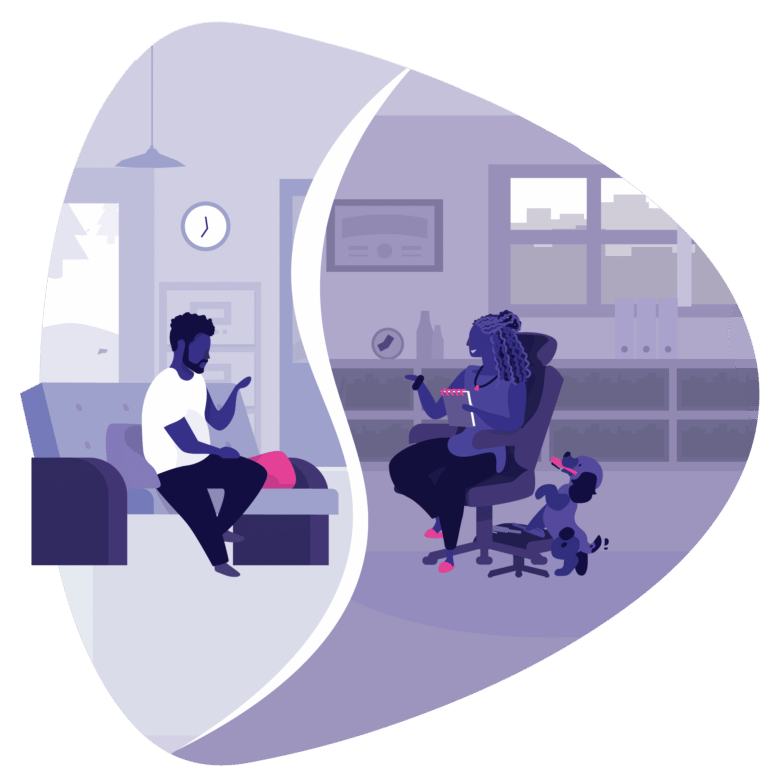Iris clinicians are at the heart of what makes our organization such a special place to work. That’s why we’re turning the spotlight on the amazing work they’re doing every day. This month, we’re sitting down to talk with once of our incredible child psychiatrists, Dr. Manoela Denman.
Q. What does a typical day as an Iris Telehealth provider look like for you?
A: My clinic starts a little later in the day because I work on the west coast and live in Texas. I can wake up in the morning and go to the gym, work out, come home, shower, and then start my day, which I think is the best thing ever for quality of life. I see about 10-12 patients a day. Depending on my clinic, I have a lunch break that is a little bit longer, which is also good. I get done at the end of the afternoon like most people, and then I enjoy time with my family.
Q. How do you foster connection with patients virtually?
A: That can be challenging, especially as a child psychiatrist working with kids. You try to get to know them better, ask questions about what they enjoy doing and how they are doing, and some patients are more comfortable with a camera. Some other patients are very uncomfortable, so it takes a little time to get them to be able to speak with us and open up. But usually, in most cases, we’re able to connect pretty well.
Q. As a healthcare professional, how do you manage work-life balance?
A: I get to work out early in the morning, which is very rewarding. I get to spend time with my family, and working from home really allows me to do so much more than when I had to drive to the clinic and spend the entire day there. That’s what made me stay with Iris and continue working via telemedicine – I just completed four years with Iris. I really enjoy having all this flexibility and ability to spend time with family and get everything I need to get done during my day and still work an eight-hour shift. That is definitely a good thing.
Q. What are your biggest learnings from your time at Iris?
A: One of the things that I had to learn was how to work from home on my own. Even though I’m interacting with people over the computer or the phone, one of the things you kind of lose from working remotely is the interaction with others at the office. You have to make sure you maintain a connection with the staff. Although you’re far from them, it’s important to maintain that connection by chatting here and there and asking about their lives. It’s also important to maintain your social relationships outside of work.
Q. What is the most rewarding part of your job?
A: The most rewarding thing about being a child psychiatrist is helping people early on in life and helping change their trajectory so they don’t have to struggle with depression for years and years and get treatment later on. Sometimes there are experiences that they’re going to lose or miss. However, by helping them at an earlier age, we’re able to make sure that they can still finish school, go to prom, enjoy things, play the sports they want to play, and be more successful adults.
Q. What do you love about working with Iris?
A: One of the things I really enjoy about Iris is the way they treat their providers. One of the reasons I ended up signing with Iris was a very small gift I received. I was interviewing with different companies and had a pretty good offer from another company. I was thinking about working with them. But after my interaction with Adam, who was the VP at the time, I changed my mind. We talked very briefly about the things I like to watch, and at that time, I was really into “Better Call Saul.” Although I was not even going to stay with Iris, Adam Hemmen sent me this little gift, and I still have it here on my desk. I thought it was the cutest thing.
That’s what Iris is, always making sure they keep us in mind, sending us small gifts at Christmas or other times. It’s not really about how much it costs, but that they’re remembering and treating us nicely and making sure that we’re happy working here. That’s really, really important.
Q. Why do you think telepsychiatry is important to the future of mental healthcare?
A: In the last four years of working with telepsychiatrists, I realized that there are not many psychiatrists, especially in smaller areas or towns. Telepsychiatry can make sure that people anywhere can get help. That’s very, very important. Of course, meeting somebody in person is amazing, and it’s a different connection, but it’s not possible. We don’t have that many psychiatrists, and we don’t have psychiatrists everywhere. Through telepsychiatry, we’re able to ensure that if you need help and are interested in getting help, you’re going to be able to get it.
At Iris, we believe our providers should be respected, valued, and applauded for the work they do, and we couldn’t be more proud to say, “thank you” to our very own Dr. Manoela Denman. If you’d like to learn more about working for Iris Telehealth, contact us today.


